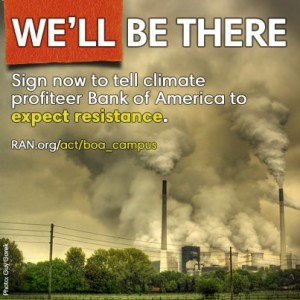 This is a guest blog by students Camila Bustos (Brown University) and Alli Welton (Harvard University).
This is a guest blog by students Camila Bustos (Brown University) and Alli Welton (Harvard University).
Earlier this month, we traveled from our universities in New England down to Charlotte, NC to attend Bank of America’s annual shareholder meeting with Rainforest Action Network. At the end of the school year, the trip meant skipping exams and ignoring final paper deadlines that would come back to bite us later–but we knew it was worth it. The meeting gave us the opportunity to look straight into the eyes of a person who has the power to cripple the coal industry: Bank of America CEO Brian Moynihan–and ask him to help us.
In his opening remarks at the meeting, Moynihan prided himself on the Bank’s $50 billion commitment to the environment. Later on that morning, however, we witnessed Mr. Moynihan dodge question after question regarding the Bank’s role as the number one lender to the coal industry.
Frontline community members spoke up with devastating stories about the cancers their community had struggled with in the shadow of coal-fired power plants, the threats to their homes and drinking water posed by new strip mines and coal export terminals. Religious leaders reminded Moynihan of his moral conscience and his responsibility to other inhabitants of this earth. Many speakers pointed out the contradiction between Bank of America’s environmental commitment and its coal financing policies. Other shareholders at the meeting heard our voices, and began mentioning climate change within their own questions about other topics such as the Bank’s foreclosure practices, executive pay, or campaign contribution disclosures. Mr. Moynihan was clearly uncomfortable when faced with the people directly impacted by his Bank’s support of the coal industry, but he dismissed most of their questions.
At the end of the meeting, it was our turn to speak. We could tell that, by this point, Mr. Moynihan had heard enough about climate change. We brought a message with us, however, that he had not heard:
“Students are tremendously concerned about climate change, and we do NOT want to work for companies like Bank of America if they are funding our destruction. We and students at 80 other colleges and universities have pledged to disrupt your recruitment sessions on our campuses until you commit to phasing out your loans to the coal industry.”
Finally, we had caught Bank of America’s attention. The moment we announced the pledges, Board members spun around in their chairs to stare at us. They heard how our generation will not stand in silence as the massive burden of climate change continues to fall on our backs. They heard how we are mobilizing to fight back, running fossil fuel divestment campaigns on hundreds of campuses across the country. They heard that we are standing in solidarity with the frontline communities whose homes and lives have already been threatened by the coal industry, and that we will be standing in Bank of America’s way if they come to our campuses next fall to recruit new employees whose work would continue aggravating the climate crisis.
Mr. Moynihan responded quickly to our questions. “We have already successfully recruited at your school,” he said, and repeated his talking point about the Bank’s $50 billion commitment to the environment. We had already seen, though, that the Board was visibly disconcerted by the pledge.
We know that we have found a pressure point, and we are prepared to leverage our power over the Bank next fall. We call on other students across the country to join us by signing the pledge and making it clear to Bank of America that, if they expect us to join their workforce and to provide them with business in the future, they need to do a better job of addressing our generation’s concerns about climate change and the human rights abuses perpetuated by the coal industry.